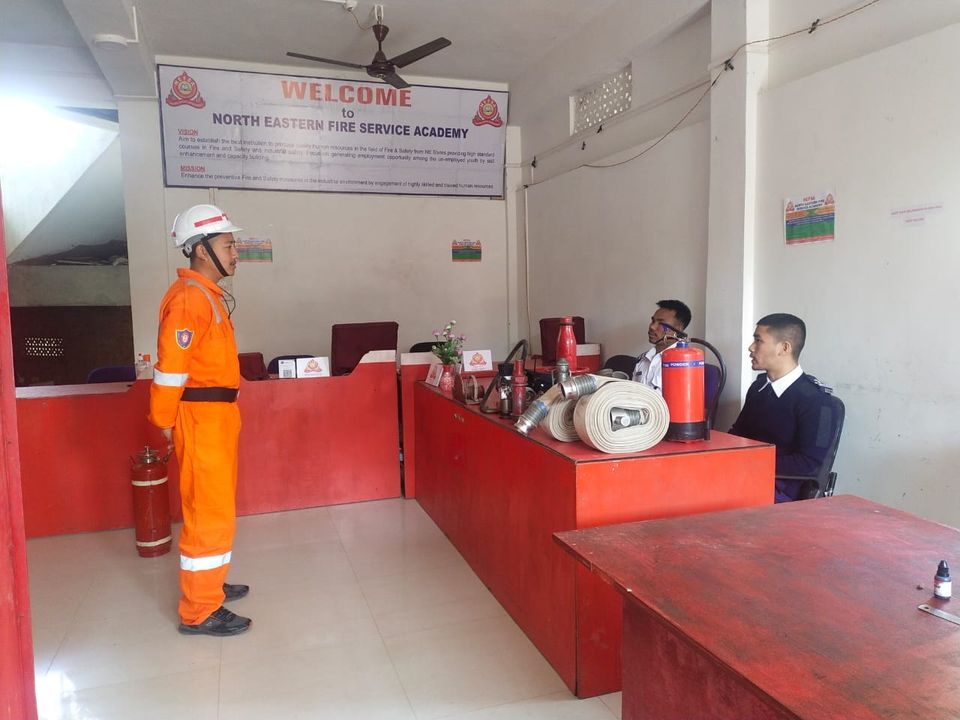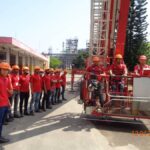In an era of rapid urbanisation, complex industrial landscapes and escalating regulatory demands, fire and safety competencies have never been more critical. For organisations and individuals alike, high‑quality fire safety training isn’t optional—it’s indispensable. The North Eastern Fire Service Academy (NEFSA) in Dibrugarh, Assam has positioned itself as a leading institution for fire & safety professional training, especially relevant for 2025 and beyond.
Here’s a deep dive into why NEFSA fire safety training matters in 2025, and what makes it a compelling choice.
1. Rising Demand for Fire Safety Professionals
The macro‑trend
-
The fire protection equipment and services market in India is expanding at a multi‑percent compound annual growth rate (CAGR).
-
Urbanisation, high‑rise construction, industrial expansion (manufacturing / oil‑&‑gas / data centres) mean more fire risk‑environments needing trained professionals.
-
Regulatory pressure is rising: building codes (like the National Building Code of India – Part IV), state level fire‑NOC procedures, fire safety audits.
-
Many organisations still face staffing shortages in certified fire‑safety roles. NEFSA’s blog mentions this gap as opportunity. Implication for 2025
If you enrol in NEFSA’s training now, you are aligning with strong market demand. You’re not just learning fire safety – you’re entering a field with increasing job openings and regulatory drivers.
2. NEFSA’s Credibility & Focus
Who is NEFSA?
-
NEFSA was established in Dibrugarh, Assam under the Indian Education Societies Act and Assam Trustee Act.
-
It is aimed at training unemployed youth from the North‐Eastern region in fire & safety roles for PSUs, industries and government departments.
What NEFSA offers for 2025
-
Awareness programmes and training in fire prevention, hazard handling and readiness measures.
3. Practical & Hands‑On Training Not Just Theory
One of the biggest differentiators for a fire safety training institute is the degree of practical simulation, real‑life drills and hands‑on experience.
NEFSA emphasises this in its training philosophy:
-
NEFSA’s blog emphasises hands‑on practical training with real‑life fire drills, use of real equipment, and field‑oriented emergency response.
-
The institution’s mission includes “high technology alongwith their technique, courses and handling procedure” to minimise fire damages.
For 2025, with more complex fire‑hazards (smart buildings, mix of materials, hybrid work‑sites), being trained in practice—not just textbook—is a major plus.
4. Regulatory & Corporate Governance Imperatives
In 2025, fire safety training matters not just for the “fire brigade” – it’s essential for corporate governance, insurance, ESG and compliance.
Key reasons:
-
Companies are increasingly required to demonstrate competent fire safety personnel, fire audits, fire‑NOC compliance, safe evacuation plans. NEFSA’s blog highlights this regulatory trend.
-
Insurance underwriters favour sites with certified safety officers and fire‑safety training. Organisations without may face higher premiums or non‑compliance risk.
-
Public safety awareness and reputational risk: major fire incidents receive intense media scrutiny; having trained staff reduces risk of damage and liability.
Thus, for anyone working in industrial sites, large buildings or infrastructure in 2025, training at NEFSA is not just beneficial—it’s becoming essential.
5. Career Opportunities & Job‑Readiness
Training at NEFSA isn’t purely academic—it’s career‑oriented. Some ways in which NEFSA positions you for 2025 job‑markets:
-
Their blog states: “100% Placement Assistance with Global Opportunities” (workers placed in oil & gas, manufacturing, airports, construction, overseas).
-
The mission emphasises preparing trainees to take up jobs in industries / PSUs / government departments.
-
With the demand side (see earlier) growing, being certified and trained gives you employability advantage: you stand out compared to general workforce.
For students in North East India (or elsewhere) looking for careers in fire safety, NEFSA offers a relevant pathway.
6. Emerging Trends & Why Training Must Evolve
Fire safety is not static. For 2025 and beyond, training must adapt to new technologies and modern hazards. A few trends:
-
Integration of VR / AR simulations for fire‑emergency training, enabling safe yet realistic scenarios.
-
Online / hybrid fire safety courses allow flexibility for working professionals. For example: “Fire Safety Online Courses in 2025” trend.
-
Changing building materials, smart buildings, mixed‑use infrastructure increase complexity of fire risk management. Training therefore must cover new risk types.
-
Sustainability and green building fire safety: fire safety training now often includes eco‑friendly suppression systems, new materials, etc.
7. Why It Matters Now (2025) vs Earlier
In earlier years fire safety training was optional‑nice to have. In 2025:
-
Regulatory pressures have matured: building codes more strictly enforced.
-
Infrastructure has grown manifold: data centres, large malls, high‐rises, industrial complexes.
-
Corporate responsibility has increased: safety is part of ESG, companies invest more.
-
Job market dynamic: With higher demand but fewer trained professionals, the gap creates opportunity. NEFSA’s own blog states this.
Thus anyone delaying training risks being left behind. Training in 2025 is timely.
8. What To Look For When Choosing NEFSA Training (or Any Fire Safety Training)?
If you’re evaluating NEFSA (or any other institute) for 2025 and onward, here are key criteria:
-
Accreditation & recognition: Have the courses been recognised by relevant authorities? NEFSA emphasises government‑recognised courses.
-
Curriculum relevance: Does the course cover fire prevention, suppression systems, hazard assessment, rescue operations, first‑aid & disaster management? NEFSA lists such modules.
-
Practical / field training: Real drills, equipment use, scenario‑based training. NEFSA emphasises hands‑on.
-
Placement support: Job‑readiness & employment assistance. NEFSA claims 100% placement assistance for some programmes.
-
Modern technology adoption: Use of simulations, updated equipment, online modules. Given the 2025 trends, this is important.
-
Affordability & accessibility: For many potential students, cost, location (NEFSA is in Dibrugarh, Assam) matter. NEFSA’s mission includes training unemployed youths in NE India.
9. Target Audiences & Who Should Enrol
Here are the typical profiles who will benefit from NEFSA training in 2025:
-
Young individuals (12th‑pass or graduates) seeking a career in fire & safety, industrial safety, disaster management.
-
Professionals already in industrial / manufacturing / construction / infrastructure sectors who need certification and upskilling in fire‑safety roles.
-
Facility‑managers, safety officers, building managers who need fire‑safety competency in their roles.
-
Organisations seeking to train internal staff, safety teams, or emergency response teams.
-
Anyone in the North‑East region of India (or elsewhere) looking for a training institute with regional presence and job links.
Conclusion
In 2025, fire safety is no longer a “nice‐to‐have” adjunct—it is integral to organisational resilience, regulatory compliance, workforce readiness and public safety. The North Eastern Fire Service Academy (NEFSA) offers a compelling training path that aligns with the current demand‑dynamics, practical skills‑gap and modern fire‑safety expectations.
If you’re considering a career in fire safety, or your organisation needs competent fire‐safety personnel, investing in NEFSA’s training now positions you well for the near‑future.
Note: This content was generated using AI based on publicly available data and industry knowledge. While we strive to provide accurate and helpful information, there may be occasional inaccuracies or outdated details. If you notice any errors or if anything needs clarification, please don’t hesitate to contact us, and we will be happy to make corrections. Thank you for your understanding!
Contact us today to know more about admissions, batch schedules, and course details.
Visit: www.nefsaindia.com
Location: Dibrugarh, Assam
For More Blogs:- Click here







